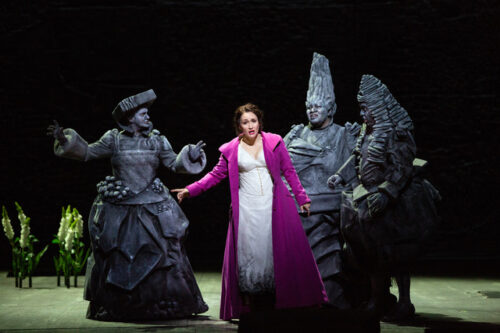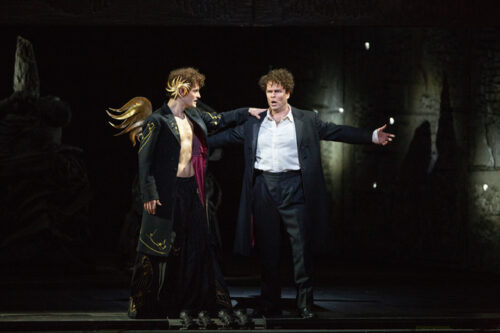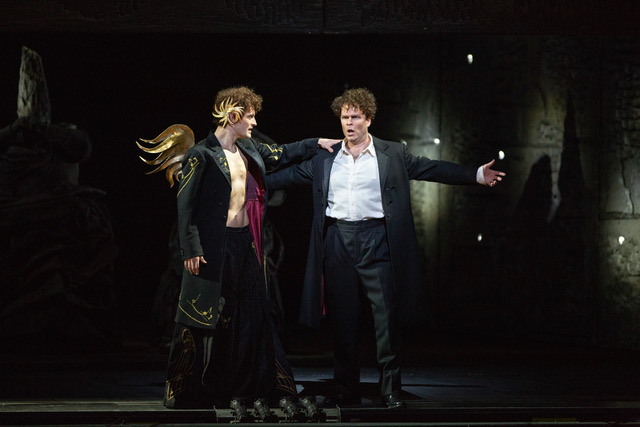 United States Matthew Aucoin, Eurydice: Soloists, Metropolitan Opera Chorus and Orchestra / Yannick Nézet-Séguin (conductor). Metropolitan Opera, New York, 23.10.2021. (RP)
United States Matthew Aucoin, Eurydice: Soloists, Metropolitan Opera Chorus and Orchestra / Yannick Nézet-Séguin (conductor). Metropolitan Opera, New York, 23.10.2021. (RP)

Production:
Librettist – Sarah Ruhl
Production – Mary Zimmerman
Sets – Daniel Ostling
Costumes – Ana Kuzmanic
Lighting – T.J. Gerckens
Projection – S. Katy Tucker
Choreographer – Denis Jones
Dramaturg – Paul Cremo
Cast:
Eurydice – Erin Morley
Orpheus – Joshua Hopkins
Orpheus’s Double – Jakub Józef Orliński
Father – Nathan Berg
Hades – Barry Banks
Little Stone – Stacey Tappan
Big Stone – Ronnita Miller
Loud Stone – Chad Shelton
Yannick Nézet-Séguin called the entire orchestra on stage for a bow during the curtain calls after the Metropolitan Opera’s premiere performance of Matthew Aucoin’s Eurydice. They had had quite a night. Aucoin’s score is a tour de force for the orchestra, with enticing displays of orchestral color, primarily in the woodwinds and percussion, that grab and hold an audience’s attention. The exciting sounds from the pit, Aucoin’s gracious writing for the voice and Sarah Ruhl’s poignant, penetrating and often humorous libretto, based upon her 2006 play of the same name, combined to create an absorbing piece of musical theater.
In the play, Ruhl recast the ancient Greek myth to tell it from the perspective of Eurydice. Orpheus and Eurydice are rather ordinary, self-absorbed young people with artistic bents – she a penchant for words, he preoccupied with his extraordinary musical gifts – who fall in love and get married. As Eurydice bemoans the rather lackluster wedding devoid of interesting people, a man interrupts the festivities and entices Eurydice to his apartment with the promise of a letter from her dead father, whose absence she has felt throughout the day.
The man has lured Eurydice to her death, and she tumbles down hundreds of stairs to the Underworld. Eurydice, brimming with privilege and demands, is met by three of Ruhl’s most wonderful creations, the stones who know the rules of the Underworld and enforce them with zeal and glee. Their introduction of themselves – ‘I’m Little Stone. I’m Big Stone. I’m Loud Stone’ – was a moment to savor.
Eurydice is instantly recognized by her father, who remarkably has retained his memory and power of language, for the dead lose both, as has Eurydice. Hades, the interesting man who interrupted her wedding reception, wants her as his bride.
Eurydice gradually realizes that the man who is so helpful and caring is her father. A letter from Orpheus expressing his love for her drops from the sky. (Later, he will use worms to carry a message to her.) When her father tells her that it is from Orpheus, it triggers something. Orpheus subsequently sends her the complete works of Shakespeare and, as her father reads King Lear to her, she slowly begins to relearn her language and regain her memory.
The rest of the story unfolds much as in the myth. Orpheus sings so movingly at the Gates of the Underworld (the rules require that it must be in a dead language, so he sings in Latin) that he is permitted entry to bring Eurydice back to the world of the living with the condition that he not look at her. Startled when Eurydice calls his name, he turns around, and the couple is torn apart. Her father, bereft at the loss of his daughter, has already dipped himself in the river (in this instance a shower that serves the purpose well) to erase his memory.
With Hades claiming her as his bride, Eurydice pens a letter to Orpheus that contains instructions for his future wife on how to take care of him. She then dips herself in the river of forgetfulness. Orpheus again descends to the Underworld, but rain obliterates his memory. He finds the letter that Eurydice wrote to him but is unable to read it.
Mary Zimmerman’s concept for Eurydice adhered closely to Ruhl’s libretto, as did Daniel Ostling’s sets. Costume designer Ana Kuzmanic’s most fanciful creations were the ghostly designs for the three stones and Hades’s lurid green costumes. Denis Jones created a wedding dance that devolved into a diabolical frenzy as the mysterious man ensnared the bride. The younger members of the audience lapped it up, bursting into laughter.
With her crystalline voice and multi-faceted characterization, Erin Morley was a captivating Eurydice. Her final aria, in which she writes to Orpheus and prepares to dip herself in the river of forgetfulness, was exquisitely sung and extremely moving. As her father, Nathan Berg expressed all of a caring father’s love and devotion with his resonant baritone, which made the loss of his daughter all the more poignant. When called upon to express his innermost emotions, however, he spoke the words to devastating effect.

Joshua Hopkins’s Orpheus was an equal mix of naïveté, ardor and bravery. Aucoin created the role of Orpheus’s Double (not in Ruhl’s original play), who appears whenever inspiration strikes Orpheus or when he is in an emotional quandary. The double never appears or sings alone and is only seen and heard with Orpheus. In his Met debut, Jakub Józef Orliński (interview here) sang the role of the double with ethereal tone and moved with the elegance and grace of a dancer: his moves energized the wedding dance. The effect of Orliński and Hopkins singing together called to mind the other-worldly sounds of a glass harmonica.
As Hades, Barry Banks was deliciously evil, negotiating the stratospheric high notes of his role with aplomb. Stacey Tappan, Ronnita Miller and Chad Shelton were an absolute delight as the three stones.
There were three things that marred the performance, all of which are easily remedied. For much of Act I, the orchestra was too loud. Second, the opera is lopsided: the first two acts are performed without intermission and a very brief third act follows. An intermission between the first two acts would make for a less exhausting sit, and would permit Aucoin’s beautiful quartet for Eurydice, Orpheus, her father and Orpheus’s Double to be enjoyed more fully.
And finally, the opera ends with a sudden blackout as Orpheus stares incomprehensibly at Eurydice’s letter. The audience instantly burst into applause, just when a moment to reflect was much needed.
Rick Perdian
